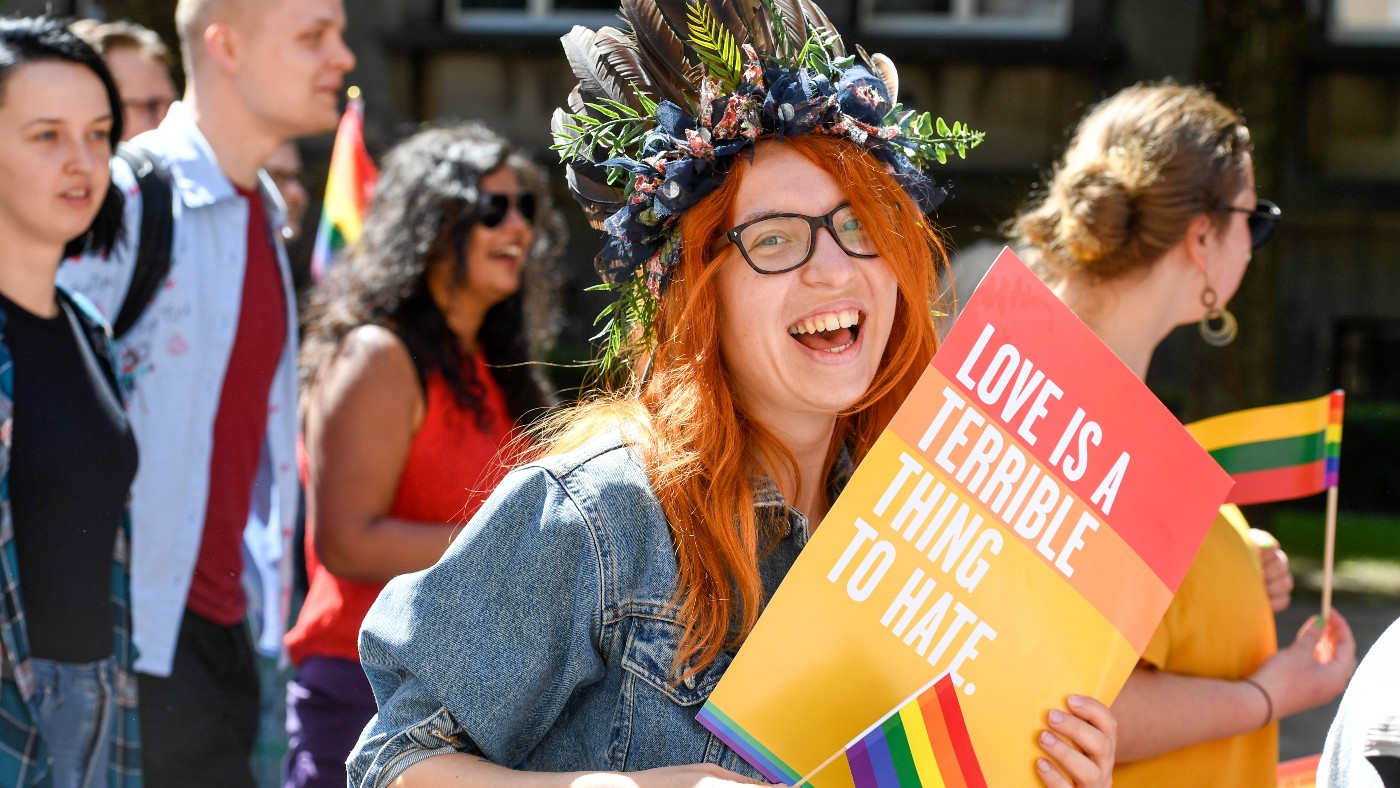The power of Estonia’s same-sex marriage law
LGBTQ people hope the country will set an example for other European nations

A free daily email with the biggest news stories of the day – and the best features from TheWeek.com
You are now subscribed
Your newsletter sign-up was successful
The decision by Estonia’s parliament to legalise same-sex marriage has been hailed as a monumental step forward, finally overcoming a series of obstacles and delays that have hampered progress on the issue.
“Same-sex couples have been able to enter a civil union in Estonia since 2014,” said Al Jazeera. But it has taken until now to close “legal loopholes” to allow gay and lesbian couples the same rights as their heterosexual counterparts.
Legislation to permit same-sex marriages was passed by 55 votes to 34 in the 101-seat parliament. Despite the closeness of the vote, Estonia has become the first former Soviet country to get such a law over the line – and it will come into effect on 1 January 2024.
The Week
Escape your echo chamber. Get the facts behind the news, plus analysis from multiple perspectives.

Sign up for The Week's Free Newsletters
From our morning news briefing to a weekly Good News Newsletter, get the best of The Week delivered directly to your inbox.
From our morning news briefing to a weekly Good News Newsletter, get the best of The Week delivered directly to your inbox.
The move has been heralded as a “statement for European values in the face of Russia’s persecution of queer people”, Openly’s Enrique Anarte stated. Russia’s invasion of Ukraine has brought the former Soviet states’ Europe-leaning cultures into sharp focus.
However, the road to marriage equality in Estonia has not been a smooth one. When it comes to the rights of LGBTQ+ people, the Baltic states have often been “in Russia’s shadow”, said NBC News.
Estonia is often heralded as a liberal nation, but it still remains “in the lower half of the ranking in legal protections for queer people”, according to LGBTQ+ advocacy group ILGA-Europe, the broadcaster added.
While same-sex marriage is “legal in 19 European countries”, said BBC Newsround – with Estonia set to bring this to 20 – this is not the case “in central European countries which were once under communist rule and members of the Moscow-led Warsaw Pact alliance”, Reuters reported.
A free daily email with the biggest news stories of the day – and the best features from TheWeek.com
Critics say Estonia is a nation rooted in its anti-LGBTQ+ past and struggling to move on from the Soviet era. Same-sex relationships were a criminal act, “punishable by up to ten years in prison”, until the law was revoked in May 1992, less than a year after the country declared independence from the collapsing Soviet Union.
Even after this, same-sex couples were subject to discrimination, viewed as “second-class citizens” or “beaten up” due to their orientation, said Estonia World’s Sten Hankewitz.
This reputation has been difficult for Estonia to shrug off, and there remains resistance to same-sex marriage from some factions of Estonian society, namely those with religious or socially conservative views.
In May, a conservative think tank backed by 59 public figures asked “the parliament not to change the concept of marriage”, ERR News reported. The petitioners suggested “there is no overriding support for such a change”.
The Estonian Orthodox Church condemned the decision, saying that “those who claim they are championing ‘freedom and love’ are in fact destroying it”, said Orthodox Christianity.
The tension does not only apply in Estonia. Its Baltic neighbours Latvia and Lithuania also have same-sex partnership bills currently stuck in their parliaments.
There has also been backlash across Europe regarding same-sex partnerships, marriage and families. Under Giorgia Meloni’s far-right government in Italy a “crackdown” is taking place, The Times reported. Lesbian mothers raising families in the country “risk being erased from official records and ordered to change the surnames of their children”, said the newspaper.
Poland remains “the worst country to be gay in the EU”, Politico added, “behind Romania and Bulgaria” in the latest ILGA-Europe rankings for rights.
Closer to Estonia, Russia is notorious for its anti-LGBTQ+ stance, and has recently expanded a so-called “gay propaganda law” in place since 2013, which “outlaws all mention of LGBTIQ-related topics in the media”, said openDemocracy.
Some have suggested the latest law change in Estonia could be a reaction to developments in Russia. Social Democrat MP Eduard Odinets said: “Same-sex marriage makes it clear to the Russians that we are not on their side,” CNE News reported.
More than half (53%) of Estonians support same-sex marriage, according to a recent report from the Estonian Human Rights Centre. This is 6 percentage points higher than it was in 2021, while only 34% of Estonians supported marriage equality in 2012.
“My message [to central European countries] is that it’s a difficult fight,” Kaja Kallas, the prime minister of Estonia, told Reuters, “but marriage and love is something that you have to promote.”
“It’s like the state is finally accepting me,” Annely Lepamaa, a 46-year-old lesbian, told Reuters. “Until now, I needed to fight for everything. Now, I’m a human with rights.”
Rebekah Evans joined The Week as newsletter editor in 2023 and has written on subjects ranging from Ukraine and Afghanistan to fast fashion and "brotox". She started her career at Reach plc, where she cut her teeth on news, before pivoting into personal finance at the height of the pandemic and cost-of-living crisis. Social affairs is another of her passions, and she has interviewed people from across the world and from all walks of life. Rebekah completed an NCTJ with the Press Association and has written for publications including The Guardian, The Week magazine, the Press Association and local newspapers.